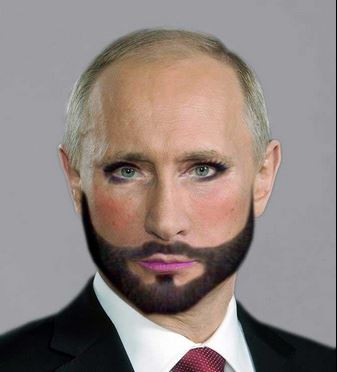The Eurovision song contest, long before the Italian TV decided to broadcast it, has been a top of the year happening in the past two decades for all the Eastern and former USSR countries. No surprise of the strong reactions by the most conservative ones as the winner of this year competition is a bearded transgender. They show two different ways of understanding freedom and democracy; and this involves the future of Ukraine, too.

While the Austrian singer Conchita Wurst was thanking the huge audience, watching live from 56 countries, for winning the Eurovision Song contest 2014, many Russians were not in mood to offer congratulations, and not because their entrants lost.
Conchita – whose name off the stage is Thomas Neuwirth – was lovely smiling trough a thick black beard, while Russian politician Vitaly Milonov, the principal sponsor of legislation criminalizing homosexual propaganda directed toward minors who had previously called for the country to boycott the contest over Wurst’s selection, said: “Eurovision is Sodom show. Even just broadcasting the competition in Russia could insult millions of Russians. The participation of the obvious transvestite and hermaphrodite Conchita Wurst on the same stage as Russian singers on live television is blatant propaganda of homosexuality and spiritual decay.”
Another prominent Russian politician echoed Milonov’s words. Vladimir Zhirinovsky, in spite of the name of the party he leads (Russia’s Liberal Democratic Party) commented: “There are no more men or women in Europe, just it. It’s the end of Europe. It has turned wild. Fifty years ago, the Soviet Army occupied Austria. We should have stayed there.”
Despite its political representatives, Russian audience warmly welcomed Conchita, giving her an incredible third place in the national televote before the Russian juries, which ranked her 11th, pushed her down in the overall ranking. But it is understood that Russian politicians don’t address to the Eurovision’s young public.
A bearded future
A bearded woman is splitting Europe in two. And, strange as it may seem, this is strictly connected to crisis in Ukraine. Russian Deputy Prime Minister Dmitry Rogozin, Kremlin’s special envoy to Transnistria whose plane was barred from Romanian airspace and allegedly scrambled while flying over Ukraine, twitted that Wurst’s win “showed supporters of European integration their European future: a bearded girl.”
Since the time it first joined the European Song Contest in 1994, Russia has been one of its most eager participants. But this year things have got off to a bad start. As relationships with Western Europe founders were at their lowest, due to its annexation of Crimea and separatist referendums in eastern Ukraine, an audience angry for Moscow’s policy on LGBT community continually hooted Russia during its entrants (the Tolmachevy Sisters, two longhaired blonde twins) performances at the contest.
The annexation of Crimea by Russia – besides the boos – caused confusion and disappointment among Russian public too, as Eurovision organizers decided to count televotes from the peninsula as they were expressed from Ukraine. The official reason was that Crimean phone operators are still using Ukrainian telephone codes, but many interpreted the decision as a political one. In the end, the blonde twins ranked behind their main rival, Maria Yaremchuk of Ukraine.
European values
Milonov, who in 2012 accused Lady Gaga to have violated law against promoting homosexuality among minors (when she called for respect for gay rights during her concert in St. Petersburg), recently proposed to ban from Russia Ukraine’s most popular band, Okean Elzy, for supporting Euromaidan. It is clear to all that statements about “degenerate Europe” and what to expect from a European integration have a direct connection with the ongoing Ukrainian unrest.
Before Janukovich’s government rejected the Association Agreement with EU, a massive anti-EU campaign by conservative pro-Russian parties was spreading the country, fomenting anti-gay sentiment with slogans like “Association with the EU means same-sex marriage.” Billboards with images of same-sex stick figure couples holding hands began to appear on the streets of the Ukrainian cities, and demonstrators were wearing t-shirts that read: “European values are gays, lesbians, and corrupting minors.”
Now that the revolution is turning to something every day more and more similar to a civil war, there is no need of billboards, and the anti-EU propaganda is carried on with guns and rifles. Still, many Ukrainians have to choose between two ways of meaning “freedom and democracy”.




